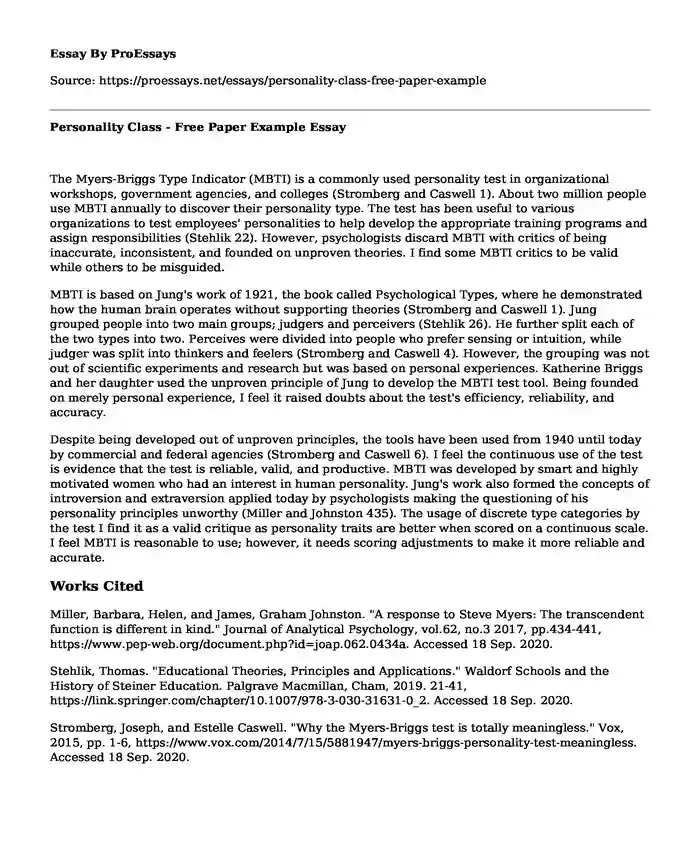The Myers-Briggs Type Indicator (MBTI) is a commonly used personality test in organizational workshops, government agencies, and colleges (Stromberg and Caswell 1). About two million people use MBTI annually to discover their personality type. The test has been useful to various organizations to test employees' personalities to help develop the appropriate training programs and assign responsibilities (Stehlik 22). However, psychologists discard MBTI with critics of being inaccurate, inconsistent, and founded on unproven theories. I find some MBTI critics to be valid while others to be misguided.
MBTI is based on Jung's work of 1921, the book called Psychological Types, where he demonstrated how the human brain operates without supporting theories (Stromberg and Caswell 1). Jung grouped people into two main groups; judgers and perceivers (Stehlik 26). He further split each of the two types into two. Perceives were divided into people who prefer sensing or intuition, while judger was split into thinkers and feelers (Stromberg and Caswell 4). However, the grouping was not out of scientific experiments and research but was based on personal experiences. Katherine Briggs and her daughter used the unproven principle of Jung to develop the MBTI test tool. Being founded on merely personal experience, I feel it raised doubts about the test's efficiency, reliability, and accuracy.
Despite being developed out of unproven principles, the tools have been used from 1940 until today by commercial and federal agencies (Stromberg and Caswell 6). I feel the continuous use of the test is evidence that the test is reliable, valid, and productive. MBTI was developed by smart and highly motivated women who had an interest in human personality. Jung's work also formed the concepts of introversion and extraversion applied today by psychologists making the questioning of his personality principles unworthy (Miller and Johnston 435). The usage of discrete type categories by the test I find it as a valid critique as personality traits are better when scored on a continuous scale. I feel MBTI is reasonable to use; however, it needs scoring adjustments to make it more reliable and accurate.
Works Cited
Miller, Barbara, Helen, and James, Graham Johnston. "A response to Steve Myers: The transcendent function is different in kind." Journal of Analytical Psychology, vol.62, no.3 2017, pp.434-441, https://www.pep-web.org/document.php?id=joap.062.0434a. Accessed 18 Sep. 2020.
Stehlik, Thomas. "Educational Theories, Principles and Applications." Waldorf Schools and the History of Steiner Education. Palgrave Macmillan, Cham, 2019. 21-41, https://link.springer.com/chapter/10.1007/978-3-030-31631-0_2. Accessed 18 Sep. 2020.
Stromberg, Joseph, and Estelle Caswell. "Why the Myers-Briggs test is totally meaningless." Vox, 2015, pp. 1-6, https://www.vox.com/2014/7/15/5881947/myers-briggs-personality-test-meaningless. Accessed 18 Sep. 2020.
Cite this page
Personality Class - Free Paper Example. (2023, Dec 18). Retrieved from https://proessays.net/essays/personality-class-free-paper-example
If you are the original author of this essay and no longer wish to have it published on the ProEssays website, please click below to request its removal:
- Adolescent Depression - Essay Example on Psychology
- Paper Example on Emotional Health of High School Students
- Research Articles Analysis on the Behaviors of People Paper Example
- Essay Sample on Mental Illness and Psychopathy
- Essay on Nurse Qualification Impact: Burnout & Career Change?
- Exploring Childhood Identity: Interviews With Two Children and Their Mothers - Essay Sample
- Essay Example on Artifacts: Doing and Making in Human Behaviour







